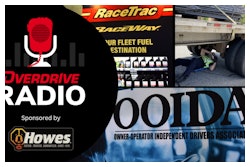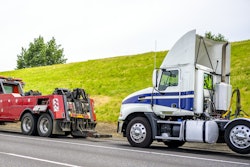Trucking news and briefs for Wednesday, April 23, 2025:
DOT, New York continue back-and-forth over congestion pricing
The U.S. Department of Transportation on Monday penned a letter to New York Governor Kathy Hochul outlining specific actions the Federal Highway Administration could take if New York City’s congestion pricing plan remains in place.
The DOT has been working this year to end the tolling plan that charges fees for vehicles entering Manhattan below 60th Street -- basically anywhere south of Central Park. The FHWA announced in February that it was terminating its approval of the pilot program for what's called the "Central Business District Tolling Program" (CBDTP) and gave New York officials until March 21 to stop collecting tolls. That deadline was later extended to April 20.
In an April 21 letter to Hochul, DOT Secretary Sean Duffy noted that the April 20 deadline passed “without New York taking action to comply." He directed the New York State DOT to show cause by May 21 as to “why FHWA should not take appropriate steps … to remedy New York’s noncompliance” in ending the program.
By May 21, Duffy is requiring NYSDOT to provide response to the FHWA’s New York Division Administrator that either certifies that the collection of tolls under the program has ended, or demonstrates that the continued collection of tolls does not violate U.S. Code that requires roads constructed with federal-aid highway funds be free from tolls of all kinds.

If the tolls continue, or if FHWA determines that New York remains out of compliance, the agency said it would halt various approvals and authorizations, including:
- Advance construction (AC) authorizations for projects within Manhattan, excepting projects determined by FHWA to be essential for safety.
- National Environmental Policy Act (NEPA) approvals for projects within Manhattan, except for safety projects.
- Approvals of Statewide Transportation Improvement Program amendments concerning New York Metropolitan Transportation Council TIP modifications.
If non-compliance continues, additional approvals and obligations could stop as well, excepting projects necessary for safety:
- Obligations of FHWA funds (both formula and competitive) for projects within New York City.
- AC authorizations for projects within New York City, except for safety projects.
- NEPA approvals for projects within New York City, except for safety projects.
[Related: NYC testing out paid truck parking, gets more time to end tolls]
Hochul responded on X with a video in which she reiterated her position that “the cameras are staying on.”
While the two sides battle in public, legal proceedings are ongoing in court. A court order filed April 9 indicates filings and motions will be accepted well into October before a decision is made on the legality of the program.
Under the tolling program, large trucks are required to pay $21.60 to enter Manhattan below 60th Street with E-Zpass, and small trucks are required to pay $14.40. There are discounts of 75% for nighttime entries to the Central Business District between 9 p.m. and 5 a.m. on weekdays, and 9 p.m. and 9 a.m. on weekends. Prices are set to increase incrementally to eventually reach the original pricing plan of $36 for trucks in 2031 and beyond.
Traffic data from TomTom released this month comparing congestion in the congestion pricing zone from January to mid-March in 2025 to the same period in 2024 shows congestion levels have fallen since the program was implemented. The company found average travel times in the area fell from 33 minutes, 53 seconds per 10 km (6.2 miles) in 2024 to 30 minutes, 48 seconds this year. During the peak hours of 3-5 p.m., TomTom data showed travel times dropped by nearly 5 minutes per 10 km.
[Related: Trump DOT terminates New York City's congestion pricing program]
Nevada Senate advances bill to double trucking insurance minimum
The Nevada Senate on Tuesday approved a bill by a narrow vote that would -- if it also passes the state Assembly and is signed by the governor -- increase the minimum liability insurance requirement for intrastate motor carriers to $1.5 million by 2030.
As reported last week, the legislation would increase the liability insurance minimum to $1 million by Jan. 1, 2026; to $1.25 million by Jan. 1, 2028; and to $1.5 million by Jan. 1, 2030.
The bill passed the state’s Senate by an 11-10 vote Tuesday. It will now move to the Assembly for consideration.
The Nevada Trucking Association has voiced opposition to the hike, with NTA CEO Paul Enos saying the “legislation threatens the livelihoods of Nevada’s trucking families and the communities they serve.”
New Jersey is currently the only state in the U.S. that requires higher liability insurance minimums that the federally-required $750,000.
[Related: Commercial auto liability: Independents' biggest insurance expense]
Fleet’s bookkeeper guilty of stealing $4M from employer
New Jersey Attorney General Matthew Platkin and the state’s Division of Criminal Justice announced that a trucking company’s bookkeeper admitted to stealing approximately $4 million from her employer and failing to pay taxes on the stolen money.
Jeanette Avellan, 62, of Howell, New Jersey, pleaded guilty before Monmouth County Superior Court Judge Natalie S. Watson to an accusation charging her with second-degree theft of movable property, third-degree failure to pay income taxes, and third-degree filing a fraudulent tax return, in exchange for a recommended sentence of four years in state prison.
“This defendant admitted to systematically stealing millions of dollars from her employer while in a position of financial trust,” Platkin said. “She will now face significant punishment for her crimes. My office will always find those who would use their positions of trust to take what isn’t rightfully theirs.”
At her plea hearing, Avellan admitted to working as a bookkeeper for West End Express Co. in South Brunswick, New Jersey, since 2005. According to the Federal Motor Carrier Safety Administration’s SAFER website, West End Express operates 157 trucks.
Avellan admitted she was entrusted with the finances of the company and, from January 2017 to January 2023, she stole approximately $4 million from the company and gambled with the money. She also admitted that she did not report on her tax returns the money she stole, filed returns knowing that they were incorrect, and did not pay taxes that she owed.
As part of the plea, Avellan agreed to make restitution of $4.03 million to her victims and pay $559,919 to the New Jersey Division of Taxation in back taxes, penalties, and interest for tax years 2019, 2020, and 2021.











